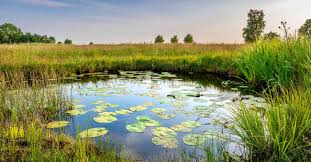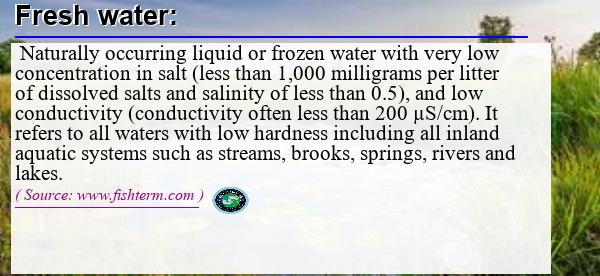Fresh water | freshwater | sweet water | fresh-water | unsalted water | non-saline water | non-salty water

TABLE OF CONTENTS
Reading time:
Last modified:
2022-11-16 00:00:00
1. Synonyms, etymology, translation, definition, examples and notes
1.1. Subject field:
- Aquatic ecosystems. (Hierarchy:
- Fisheries >
- Aquatic ecosystem management >
- Aquatic ecosystems )
- Aquatic navigation. (Hierarchy:
- Fisheries >
- Aquatic navigation )
- River navigation. (Hierarchy:
- Fisheries >
- Aquatic navigation >
- River navigation )
1.2. IPA transcription and prononciation for fresh water, freshwater, sweet water, fresh-water, unsalted water, non-saline water and non-salty water:
- fresh water: Amer. /ˈfreʃwɔːtər/ Brit. /ˈfreʃwɔːtə/ ;
- soft water: /sɒft ˈwɔːtə/ ;
- sweetwater: /swiːt ˈwɔːtə/ ,
1.3. Synonyms of fresh water:
There are 6 international synonyms for fresh water. These include:

Graph 1 : fresh water, freshwater, sweet water, fresh-water, unsalted water, non-saline water, non-salty water - Google ngram extract ( graph of term etymology and evolution. Source: Google ngram )
1.4. Etymology of Fresh water:
Freshwater, soft water, fresh-water, fresh water and sweet water are all synonyms for the same context.
1. Fresh water (with space) is the first orthography of freshwater (without space), most popular before the 20th century. It was later replaced and pushed to second most popular term by the shorter orthography, freshwater (without space) in the 1970. Today, freshwater is the most popular of all synonyms for this concept.
Origin of freshwater:
2. Freshwater came from Middle English freche watur, equivalent to fresh + water. The term freshwater got into standard English usage around the 16th century. Earliest publications we could find were published after the 1550s. Some of which include:
- The Vnion of the Two Noble and Illustre Famelies of Lancastre and Yorke (etc.) by Edward Halle , published in 1550. Freshwater was used in the excerpt: "... freshwater and other victails necessary , which knightes."
- A Nievve Herball, Or Historie of Plantes : Wherin is Contayned the Vvhole Discourse and Perfect Description of All Sortes of Herbes and Plantes: … by Rembert Dodoens, Henry Lyte · published in 1578. Freshwater was used precisely on page 426, in the excerpt: "... freshwater Creauis ."
- The Nomenclator, Or Remembrancer of A. J. ... Written in Latine, Greeke, French and Other Forrein Tongues and Now in English by J. Higins. With a Dictional Index by Adrianus JUNIUS, John HIGGINS (Poet.) · 1585, published in 1550. Freshwater was used precisely on page 483, in the excerpt: "... freshwater foutier : a young fouldier."
Other international minor synonyms like ‘fresh-water’, ‘sweet water’ and ‘soft water’ are equally popularly used in some regions of the world.
3. ‘Soft water’ slipped in as a synonym in the 18th century, precisely around the 1710s. Some early publications we could find featuring this word are:
- The Natural History of Northampton-shire with Some Account of the Antiquities (etc.). A book by John Morton published in 1712: ‘Soft water’ is used on page 268.
- Ovid's Art of Love. In three books. Translated by Mr. Dryden, Mr. Congreve, &c. Together with the Remedy of Love, etc By Ovid in 1712. ‘Soft water’ is used on page 35.
4. ‘Sweet water’ was first used in the 16th century. Some ancient books featuring ‘sweet water’ include:
- Foure Bookes of Husbandry ... Newly Englished, and encreased by B. Googe. B.L. By Conrad Heresbach · 1601 - found inside – page 47, from the excerpt: ‘... sweet water is onely to be bled . And because I haue begun to entreat of warring’
- Bulleins Bulwarke of Defence Against All Sicknesse, Soarenesse, and Woundes that Doe Dayly Assaulte Mankinde… By William Bullein · 1579. - found inside – page 54, from the excerpt: ‘... sweet water , frongly frayned.’
1.5. French translation of fresh water:
Fresh water can be translated into French as:1.6. Definition of fresh water in fisheries:

1.7. Plural of fresh water:
Fresh waters; sweet waters; fresh water bodies;
1.8. Notes on fresh water
Freshwater, also called sweet water, fresh-water, unsalted water, non-saline water, non-salty water refers to water bodies, which are renewable, and variable, but finite natural resource. Fresh water bodies are replenished through the natural water cycle, in which water from oceans, seas, lakes, forests, land, rivers and reservoirs evaporates, forms clouds, and returns inland as precipitation.
Characteristics of freshwater
- It’s is a renewable and variable, but finite natural resource;
- Contains less than 1,000 ppm of dissolved salt;
- It is easily replenished through the natural water cycle;
- It is the main source of brackish and saline water bodies like estuaries, seas, oceans, etc.
- It is often, but not always potable water (that is, water safe to drink by humans);
Examples and forms of freshwater
In our everyday lives, we do interact in one way or the other with freshwater forms. Freshwater takes many forms. The gaseous form (clouds), the liquid form (e.g. rain water, well water, ponds, lakes, springs, creeks, brooks, streams, rivers) and the solid form (like icebergs, snows).
Facts about freshwater
Authors hold that water covers about 75% of the earth’s surface, but just a very small proportion is fresh water that can be used directly by people, animals and plants because:
- 97% of the earth’s water is in oceans and is too salty for man, animals or plants to use;
- 2% is frozen at the north and south poles, in glaciers and on snowy mountain ranges.
- Only 1% is fresh water but not all of it can be used. Some of this water is located under the ground, some is too polluted to use - water pollution also reduces the availability of fresh water. Some is not accessible to man (about 90% of the world’s fresh water is locked up in ice in Antarctica);
- According to USGS: only 2.5 percent of Earth's water is freshwater, and only a little more than 1.2 percent of all freshwater is surface water;
- Freshwater ecosystems underpin all human social and economic activity;
Fresh water should not be mistaken for soft water, as these are two different concepts. Below is a tabular breakdown of the major differences (table 1) and similarities (table 1) between freshwater and soft water.
Table 1: differences between fresh and soft water
|
|
Fresh water |
Soft water |
|
Measurement entity |
Water salinity |
Water hardness |
|
Vital chemicals responsible |
Determined by quantities of salts like sodium chloride, magnesium sulphate, potassium nitrate, and sodium bicarbonate, which dissolve into ions. |
Determined by quantities of salts of Calcium and Magnesium dissolved in water are responsible for the softness or hardness of water. |
|
Salinity |
Less than 1,000 milligrams per litter of dissolved salts like sodium chloride, magnesium sulphate, potassium nitrate, and sodium bicarbonate |
May be having even more than 1,000 milligrams per litter of dissolved salts. So long as the concentration of Calcium and Magnesium is low, it will still be soft. |
|
Main ions |
Many other ions in addition to Calcium and Magnesium. |
Only Calcium and Magnesium |
|
Examples |
Rivers, streams, wells, etc. |
All freshwater bodies excluding deep underground well water. |
|
Scope |
Almost all soft water bodies are freshwaters |
Not all fresh waters are soft. E.g. well is freshwater but it may not be soft |
Table 2: similarities between soft and fresh water
|
|
Soft water |
Fresh water |
|
Amount of dissolved salts |
Low |
Low |
|
Salinity |
Generally low |
Generally low |
|
Location |
Inland |
Inland |
Fishery terminology records for Fresh water
1. Decree No. 95/413 /PM of 20 June 1995 to lay down certain conditions for the application of fisheries regulations., Chapter I, article 2, paragraph 7:
" Fish farming: the rearing of animal species, especially fish, in fresh water. "
2. Law No. 94/01 of 20 January 1994 to lay down forestry, wildlife and fisheries regulations in Cameroon, article 4:
" Fishery resources, within the context of this law, means fish, seafood, molluscs and algae from the marine, estuarine and fresh water environments, including sedentary animals in such environments. "
LEAVE A COMMENT




 Linkedin
Linkedin share
share tweet
tweet